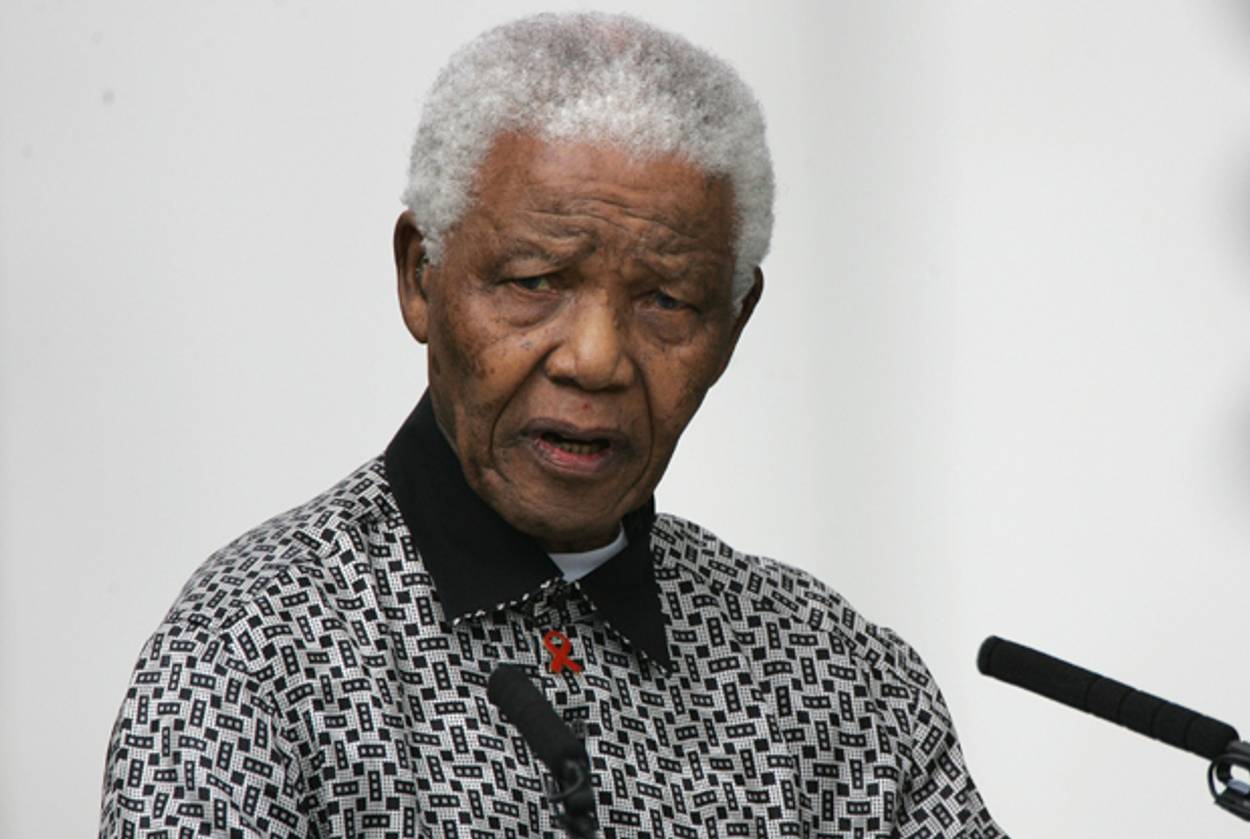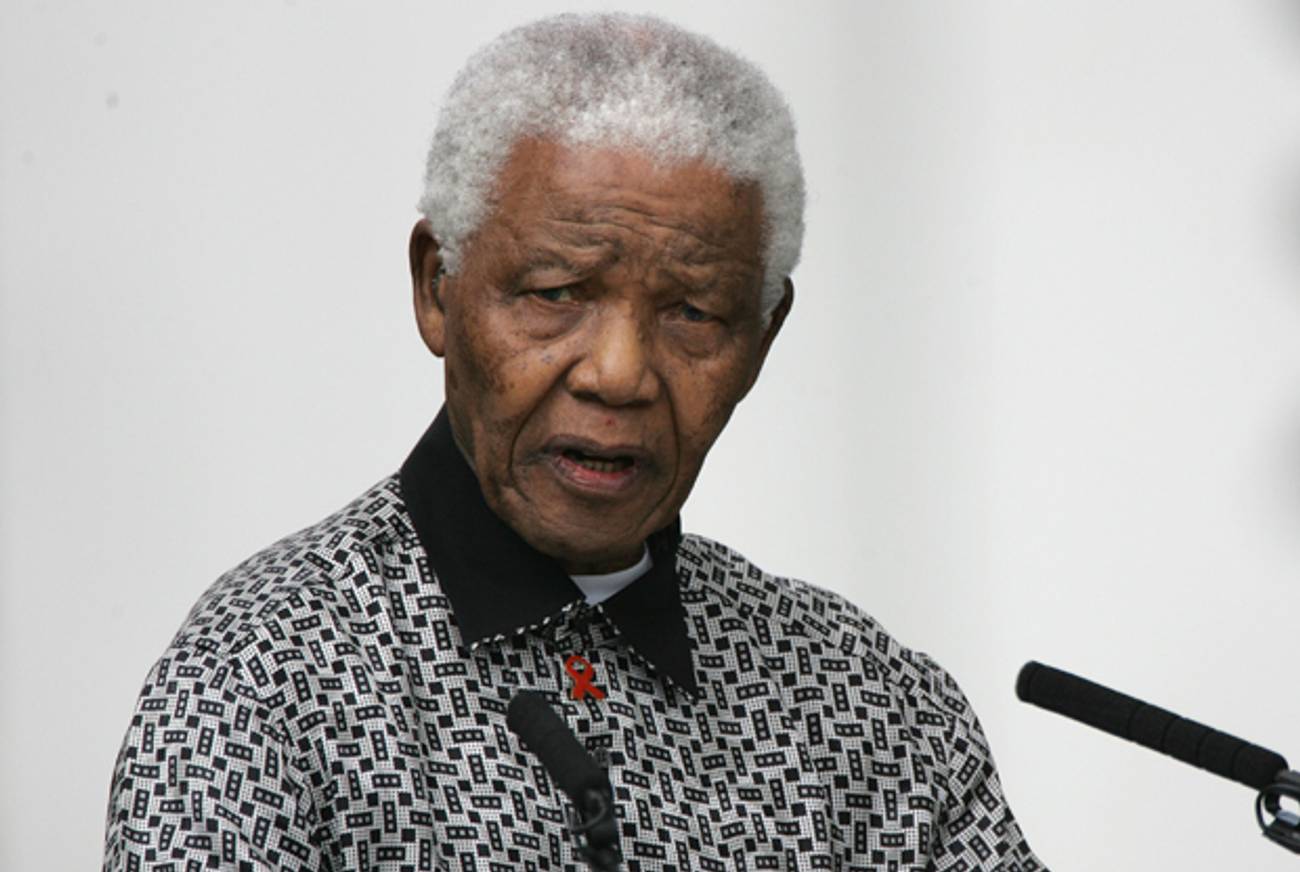The Rabbi and Nelson Mandela
What the South African leader, hospitalized in critical condition, taught me




The news that Nelson Mandela is in critical condition at a South African hospital has brought back memories of the three amazing years that I spent in that country, from 1994 to 1997. I led Temple Israel Green Point in Cape Town and worked as a Research Associate at the Kaplan Centre for Jewish Studies and Research at the University of Cape Town.
Mandela’s political accomplishment in leading South Africa from apartheid to democracy has continued to be an inspiration to me as I worked in the southern part of the United States (Albany, Georgia) and now in Kingston, Jamaica. I have tried to apply the lessons I learned from him in my rabbinate, although it has not always been easy.
I met then-President Mandela on a number of occasions, particularly when there was an interfaith religious service. As one of the few Reform rabbis in the country, I was able to enter into the St Georges Cathedral, the Anglican church in Cape Town where most of these events took place (and where the Orthodox Chief Rabbi Cyril Harris would not enter). I therefore became by default the symbolic representative of Judaism at these events, including the induction of the Truth and Reconciliation Commission.
I arrived in the country in 1994, the same year that President Mandela published his autobiography, Long Walk to Freedom, in which he describes his twenty seven years in South African prisons following his conviction at the 1964 Rivonia Trial. The book tells of his release from Robben Island and the negotiated process that led to the end of apartheid and the first democratically-elected government in the history of the Republic of South Africa. His insistence on placing reconciliation over justice struck me as a profound act of goodwill that became the cornerstone of the building of the new South Africa, for which I had a good deal of enthusiasm.
The tremendous importance that Mandela has had for South Africans was eloquently described by Archbishop Desmond Tutu. As Tutu wrote in his book—and relayed to me during a Shabbat dinner after speaking at my synagogue that same year—of hearing the February 10, 1990 announcement that Mandela would be freed from prison the following day: “We are all just exuberant. We’ve been praying and working and campaigning for this release and we are on Cloud Nine….It [the release] is saying to us, God Hears…God acts, God is really involved.”
Mandela’s release would allow negotiations to begin, triggering the hope that all people in the land would be free together. “Twenty seven years in gaol is no plaything,” Tutu wrote. “And he has remained, even on the testimony of people who would have been his enemies, a gracious person.”
Jews—particularly Progressive Jews—shared in this exuberation. Reeva Forman, editor of the newsletter of Temple Israel in Hillbrow, Johannesburg, the flagship of Reform congregations in South Africa, wrote in the December 1995 issue:
For the first time in our history a political leader taking control did not resort to revenge and hatred against those who in the past had acted against him and others so wrongfully. A spiritual pioneer and person, our President Nelson Mandela will go down in history as the greatest leader and human the world has yet seen.
In fact, she added, Mandela “is a magnificent example of what that great Jewish teacher, Hillel, says when asked to explain the Jewish religion while standing on one foot…do unto others as you would have them do unto you.”
This sort of respect for Mandela—some might even describe it as hero worship—would have been unthinkable just a few short years earlier. Much of this admiration was due to the fact that Mandela consistently stressed the need for healing and reconciliation. In a memorable passage in his autobiography, Mandela writes that he was not born with a hunger to be free. It was only when he learned that his boyhood freedom was an illusion that he began to hunger for that freedom. At first he wanted freedom only for himself, and then for his family. But then he began to hunger for the freedom of his tribe, the Xhosa people. Then, in prison, “It was during those long and lonely years that my hunger for the freedom of my own people became a hunger for the freedom of all people, white and black.”
Mandela wrote:
…as well as I knew anything that the oppressor must be liberated just as surely as the oppressed. A man who takes away another man’s freedom is a prisoner of hatred, he is locked behind the bars of prejudice and narrow-mindedness. I am not truly free if I am taking away someone else’s freedom. Just as surely as I am not free when my freedom is taken from me. The oppressed and the oppressor alike are robbed of their community.
I pray for Nelson Mandela and for the idealistic hope that he represents. While there were many aspects to his complex personality and many policy legacies resulting from his political career, I choose to remember the good, the optimistic, and the pure. He is a model for how we can and should live our lives. For that, above all, I am grateful to him.
Dana Evan Kaplan is the rabbi of the United Congregation of Israelites in Kingston, Jamaica, and former rabbi of Temple B’nai Israel in Albany, Georgia. He is the author of the forthcoming The New Reform Judaism (Jewish Publication Society), as well as Contemporary American Judaism: Transformation and Renewal, The Cambridge Companion to American Judaism, American Reform Judaism: An Introduction, Platforms and Prayer Books, and Contemporary Debates in American Reform Judaism.